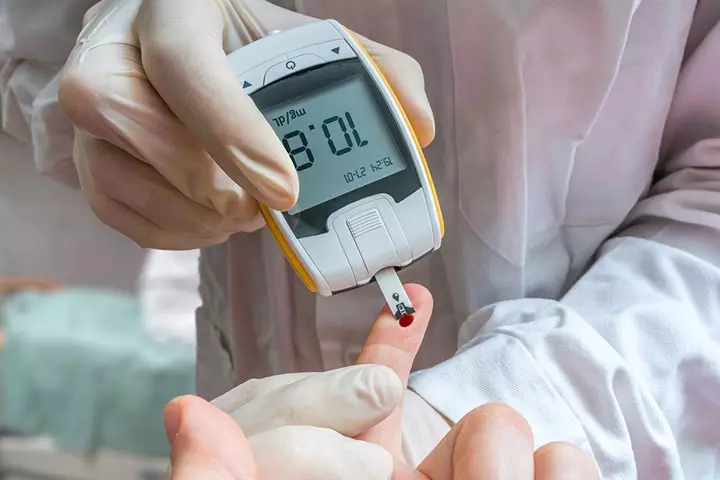
Image: Shutterstock
Diabetes is a condition when the level of blood sugar in a person is higher than the recommended levels. It is a common disease that can prove fatal if not monitored and treated correctly. No wonder that it is also referred to as a “silent killer”. In today’s day and age of fast food and high sugar intake it is all the more important to be aware of diabetes and the dangers it poses (1). The world observes November 14th as World Diabetes Day, so that more awareness is spread on this health condition.
Although many people know about diabetes, not a lot of us are aware of gestational diabetes. Without the proper care and medical intervention, gestational diabetes can negatively impact the health of a pregnant mother and her unborn baby. It can also have a lasting impact after the pregnancy has come to an end. Knowing about gestational diabetes, its risk factors, and the preventive measures can shed light on what you can do if you are diagnosed with this condition. Read on to understand and learn more about gestational diabetes (2):
What Is Gestational Diabetes?

Image: Shutterstock
Just as the name suggests, gestational diabetes is a medical condition in which a woman is diagnosed with diabetes during pregnancy, leading to high blood sugar. The bad news is that if left unattended, it can cause many complications for you and your baby. But the good news is that with the proper treatment and a lifestyle change, you can control gestational diabetes. In most cases, the blood sugar levels in women with gestational diabetes return to normal shortly after the delivery. There are no noticeable symptoms, but frequent urination or extreme thirst may indicate gestational diabetes (2).
Risks Associated With Gestational Diabetes

Image: Shutterstock
Expectant mothers who have been diagnosed with gestational diabetes are often worried about their health and the condition of their babies. Truth be told, gestational diabetes can put you at risk for many complications. We’ve listed a few common problems associated with gestational diabetes (3):
- You May Have To Undergo Cesarean Process: In most cases if a woman is diagnosed with gestational diabetes, the doctor recommends a C-section instead of a normal delivery. This is to avoid any complications that may arise during normal birth, as in the case of a cesarean section, the doctors will be more prepared.
- Preeclampsia And High Blood Pressure: Women who have gestational diabetes are at risk for high blood pressure and preeclampsia, both of which can prove to be fatal for mother and child.
- Diabetes In The Long Run: Most women who have gestational diabetes tend to get the same again if they have a future pregnancy. Additionally, women with gestational diabetes also are at risk for type 2 diabetes in the long run.
- Excessive Birth Weight For The Baby: Mothers who have had gestational diabetes or blood sugar levels higher than usual tend to give birth to babies with excessive birth weight. The increase in blood sugar levels can cause babies to grow larger than average. If the babies weigh more than nine pounds, there are chances that they could get lodged in the birth canal and thereby have birth injuries. All of this leads to the need for cesarean birth.
- Preterm Labor: Your risk of early labor is above normal if you have high blood sugar levels. Women who have gestational diabetes are more likely to give birth before the due date. This also happens because the baby tends to be of excessive weight.
- Low Blood Sugar In Babies: It may sound ironic, but it’s true. Some babies tend to have low blood sugar levels or hypoglycemia soon after birth, while their mothers have gestational diabetes. Medical intervention will be required as low blood sugar in infants can lead to seizures and other complications.
- Difficulty In Breathing: Babies whose mothers have gestational diabetes often face respiratory challenges. It has been observed that these babies tend to suffer from respiratory distress syndrome and often require medical intervention.
- Still Birth: Sadly, if gestational diabetes is not managed or poorly treated, there are chances that the pregnancy will end with a stillbirth. Sometimes, the baby dies soon after birth.
How Can You Prevent Gestational Diabetes?

Image: Shutterstock
When it comes to gestational diabetes, there is no sure-fire way to tell what you can do to prevent it. However, it is best to adopt healthy habits before and during pregnancy so you can lower your chances of being diagnosed with gestational diabetes. Also, if you have been diagnosed with gestational diabetes in a previous pregnancy, these preventive measures can reduce your chances of having it again (3):
- Eat Healthy, Well-Balanced Food: Time and again, it has been told that healthy eating is a must. This holds good for gestational diabetes as well. Opt for foods that are high in protein and fiber. Make sure fruits, vegetables, and whole grains are always a part of your diet. You may have food cravings, and it is okay to indulge once in a while, but don’t make unhealthy eating choices a habit. Also, keep an eye on your portion sizes.
- Incorporate A Good Workout Regime: Medical professionals recommend at least 150 minutes of physical activity or exercise every week during pregnancy. Stick to moderate-intensity aerobic exercises such as walking, yoga, or swimming. Keep yourself active throughout the day.
- Maintain Optimal Weight: Weight gain during pregnancy is inevitable. In fact, it is normal and essential to gain weight. However, too much weight gain is unhealthy, so watch your weight while pregnant.
So if you’re an expecting mother and are worried about gestational weight and diabetes, it is better to monitor and take precautions early on. Regular self-care, good eating habits and exercises go a long way in keeping gestational diabetes from becoming a risk. Even if the condition has gone away after delivery, it is best to do regular check-ups to see if there is a relapse. Keep a tab on your weight, and make it a point to contact your doctor if you experience any discomfort during your pregnancy. What are your thoughts on this? Let us know in the comments below!
References
- Diabetes mellitus: The epidemic of the century
https://www.ncbi.nlm.nih.gov/pmc/articles/PMC4478580/ - Gestational Diabetes
https://www.ncbi.nlm.nih.gov/books/NBK545196/ - Gestational Diabetes Mellitus: Risks and Management during and after Pregnancy
https://www.ncbi.nlm.nih.gov/pmc/articles/PMC4404707/
Community Experiences
Join the conversation and become a part of our nurturing community! Share your stories, experiences, and insights to connect with fellow parents.












